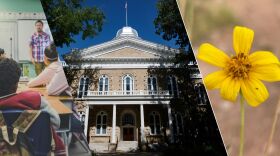Americans believe democracy is in danger —but not from the outside.
From us.
In January, 64% in an NPR survey said democracy is failing and at risk. Another poll that month by Quinnipac University found Republicans and Democrats believe political instability is a bigger threat to the U.S. than adversaries. Then Brookings Institute put the blame on disinformation.
But misrepresenting a political opponent's belief or just simply lying —telling people, for instance that former President Donald Trump won the 2020 election—hasn’t that always happened? And if it’s having more of an impact on us now, is that our fault because we listen only to what we want to hear? Or we read only slanted versions of news that fit our biases?
Misinformation and disinformation are both untrue, but disinformation is passed on willingly, said Steve Sebelius, the government and politics editor for the Las Vegas Review-Journal. He joined State of Nevada host Joe Schoenmann to explain further.
Nevada voters still face disinformation that the 2020 election was rightfully won by former President Donald Trump.
“I think the January 6 committee has demonstrated conclusively that that's [disinformation],” he said. “This is information that people know to be false, but they're distributing it anyway to lead people to an incorrect conclusion. And a lot of people here bought into that. And you see that in polls, you see that with the fact that Jim Marchant, who's one of the foremost advocates of a stolen election, won the Republican primary for Secretary of State. So yeah, I think that's having an impact here in Nevada.”
It’s the most important race on the ballot, he said, with Democrat challenger Cisco Aguilar.
“For the precise reason that you said it determines how the elections are conducted. The Secretary of State has oversight of these things. And a person who doesn't believe, for example, that electronic voting machines are secure or that mail balloting is improper could have some serious impacts and effects on the election,” he said.
But is disinformation different from regular partisan politics?
Sebelius said the goal for politicians is to motivate the base.
“The people who are spreading that information know that they have their voters mobilized and they are going to turn out their voters to the polls. So there is an intent and an effect behind it,” he said. “The advertising is designed to diminish your interest in voting, because people are trying to tell you it really doesn't matter. Also, it's difficult to find information. I mean, you can go to a candidate's website, but you're going to assume correctly that everything on our website is self-serving and may not be the complete truth.”
He points voters to resources such as the Review-Journal’s voter guide. Nevada Public Radio, as well as several other reputable local news sources, publish one each election.
Every election, “we decide what the future of the country is,” Sebelius said. But in the past five-plus years, institutions such as elections, courts, Congress, media and business, have come under attack.
“We’re showing the fault lines here,” he said.
But, democracy has prevailed because “we’ve taken that very seriously. … If we stop taking it seriously, we are in danger of losing that.”
Meanwhile, Sondra Cosgrove, a history professor at College of Southern Nevada, said her students pick up on how local TV ads misrepresent opponents. Cosgrove is also the executive director of Vote Nevada.
“They're saying to me, based on the TV commercials they see, ‘Everybody is apparently a horrible person and awful and evil.’ So why should they even vote?”
She said from there, look at the candidate’s record, look at what they’ve done in office or as a public servant, “or turn the TV off and try not to listen.”
Cosgrove said one of her students deeply researches the candidates.
“She knows the bills. She knows what an elected official has actually done, and then goes where she knows they're going to be in person and actually says, ‘You know, I see a discrepancy between what you're saying and what I know that you've done.’”
Fred Lokken, department chair of business, political science and history, Truckee Meadows Community College, said there’s no truth in advertising requirements for political ads in Nevada. He called that tragic, but said he’s frustrated by cable news shows – “a sea of opinions that are biased by literally a network.”
“There's a sickness in American democracy. And we don't have an appetite by either party to fix it,” he said.
What can be done?
"Government has not been working the way it was designed to. It's probably easier to start some of these reforms at the state level," Lokken said. "We remain one of the purplish states and so we get inundated in ways that other voters are not subjected to. But the the false advertising is omnipresent. ... We literally have to reduce the complexity of our democracy, get the money out, reduce our campaigns, so that people can kind of focus on issues."
Sondra Cosgrove, history professor, College of Southern Nevada; Steve Sebelius, politics and government editor, Las Vegas Review-Journal; Fred Lokken, department chair of business, political science and history, Truckee Meadows Community College











